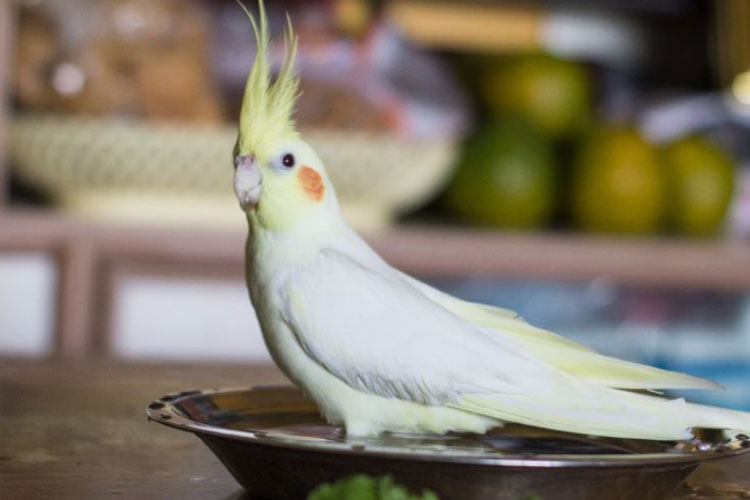Cockatiel owners are very sincere about maintaining a proper diet for their pets. But we often forget the importance of bathing our birds. It improves their physical hygiene as well as prevents many diseases from lashing onto these pet birds. However, bathing a cockatiel can be tricky.
So, how to bathe a cockatiel? Different cockatiels prefer different ways of bathing. They can be summarized as preparation of the water source, the cockatiel’s preference for bathing, encouraging the cockatiel, and drying it.
However, maintaining your pet’s hygiene can often be daunting, and being neglected can also be dangerous. Thus, in this article, we’ll dig a bit deeper and discuss every single step in great detail. So feel free to dive right in!
How to Bathe a Cockatiel? 4 Easy to Follow Tips
Here we will discuss all four strategic tips to help you bathe your cockatiel and keep your pet hygienic. The 4 steps are mentioned in the introduction, but this time in great detail.
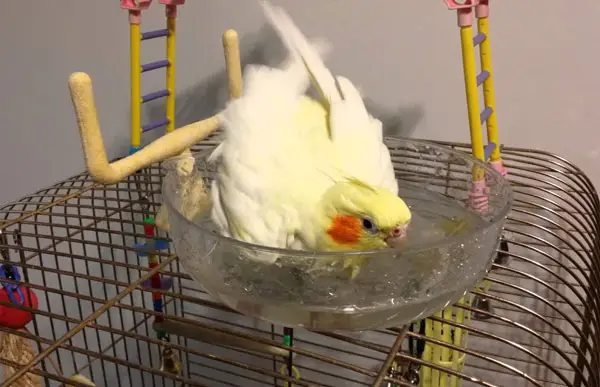
1. Prepare the cockatiel for the bathe
The first thing we need to understand is that every cockatiel might have a different approach to bathing. Hence, a different preparation is also required.
If your cockatiel panics near water and scratches its surroundings with its nails, maybe it is a good idea to trim its nails regularly.
Although not all cockatiels show similar behavior when panicking; some just tend to fly away. So it is better to keep their wings well-trimmed and windows closed so that they don’t cause havoc or fly away just in case.
And if your cockatiel is friendly to water and does not panic in front of it, voila! All you need to do is just put your cockatiel and feed it something it likes to keep in a good mood. Then, off you go to an enjoyable shower!
Here is also a youtube video to help you encourage your cockatiel to bathe.
2. Choose the bathing option according to their preference
As already discussed, different cockatiels exhibit different degrees of hydrophobia. We may categorize them into 3:
- None: Some cockatiels are comfortable around water. For them, we just need to make them feel comfortable just before showering as already discussed. But how would I know that they have no hydrophobia?
Well, when taking a shower for yourself, let your cockatiel roam around the bathroom. If it shows eagerness to bathe with you, your cockatiel has almost no hydrophobia.
- Mild: If it does not show interest in showering with you, you could try sparkling water from a spray bottle on it. For cockatiels that are mildly afraid of water, should do it for them.
- Extreme: For cockatiels that are not comfortable being bathed, they should be left to bathe themselves like they do in the wilderness. Cockatiels in the wild prefer puddings of water bodies to immerse themselves completely and soak their body. Similarly, you can put a shallow dish of water to encourage your cockatiel to do the same.
3. Encouraging them to shower
After getting to know your cockatiel’s preference for bathing, now is a good time to discuss how to encourage your pet. We could take multitudes of steps to encourage our cockatiel.
- Let it see other cockatiels (if you happen to pet multiples of them) bathing
- Use its favorite toy during showering
- Lure it with treats
- Use soft misty voices to calm her down
- Use green leaves
- Try sparkling water playfully
The key point to take here is to not force your cockatiel to bathe if it does not want to. Maybe try a different method or a different day, but don’t force it. It would make them more hydrophobic as a result.
Using treats such as green leaves or luring it with misty voices are some of the best ways to encourage your cockatiel.
4. Dry them with a towel gently
Do not, I repeat, do not leave your cockatiel wet after a shower. Not only could they catch a cold, but dust particles would again get attracted to those dry feathers. Hence, dry them out gently with a soft towel. Do not use rough fabric or additional force when drying their feathers either.
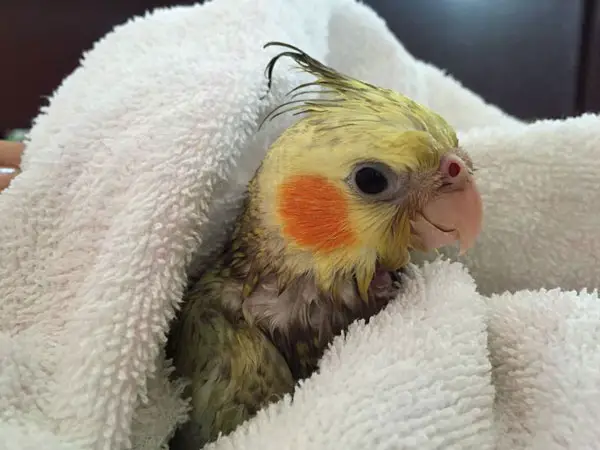
Some cockatiels are more hydrophobic by nature than the rest. In that sense, we need to improvise per our bird’s behavior and needs. Sure they may be harder to bathe, but do not worry; we have tricks up our sleeves to share. Before that, we need to talk about the importance of bathing once more.
Hydrophobia Among Cockatiels
Cockatiels are inherently hydrophobic, some more than others. Even in the wilds, some like to dive into a pond to wash. Others tend to take a shower during a downpour. And very few of them, who are extremely hydrophobic, tend to clean themselves in a small pool of water after rain.
Therefore, we can’t just force our cockatiel to take a bath with us or take bathing lightly. Your friend’s cockatiel might not be hydrophobic, but your one could certainly be. Hence, try to adjust following your cockatiel’s preference.
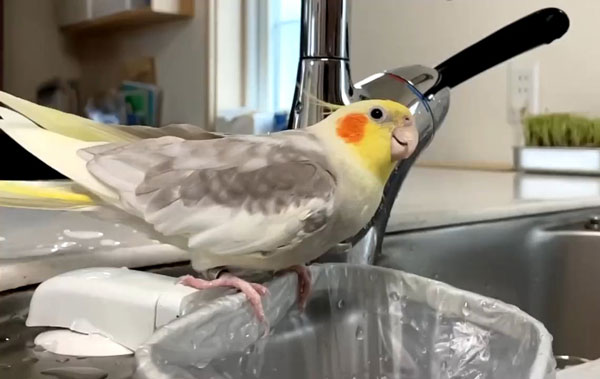
Forcing a cockatiel into a bath would make it more hydrophobic. In the long run, there could be both bad mental as well as physical side effects due to such actions.
Importance of Bathing
To make sure we get our message across, we are mentioning this topic yet again! Some of the cockatiel owners don’t show much interest in bathing their pets regularly. True; it can be hard sometimes, but bathing is very, very important to ensure a healthy cockatiel.
Bathing your cockatiel is important because they’re known as the dustiest bird, producing clouds of white powder from the powder-down feathers close to their skin. If they are not bathed, they will preen themselves until they have clean feathers all around them. Preening while their feathers and skins are dead-dry for weeks can lead to skin rash and allergies.
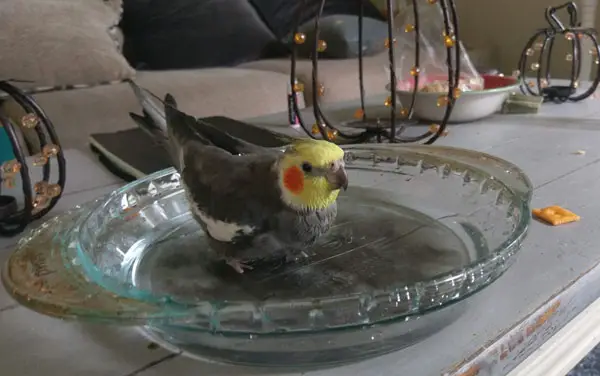
On the other hand, they are also prone to fungal diseases such as Aspergillosis. If the fungal pores are not washed off with water, preening could get inside the lungs of your birds. Diseases like Aspergillosis or worse could very well affect your bird then.
Hence, birds such as cockatiels require their feathers to be cleaned regularly to be hygienic. And when they’ll have clean feathers, their cage cannot get polluted as much anymore when they are preening.
FAQ
Here, we shall discuss the most frequently asked questions about bathing a cockatiel.
It depends vastly on your cockatiel’s nature. A good rule of thumb is twice a week in summer and once a week in winter. However, if your cockatiel is fond of bathing, thrice a week in summer and twice a week in warm, comfortable water in winter.
Yes, it is harmful. The soap intended for us humans is not intended to wash the body of a cockatiel. Besides, soap could have chemicals that are not harmful to us, but could harm our cockatiel. Moreover, they remove body oil from the skin of the cockatiel, which is essential to its well-being.
Yes, shampoos are harmful. It may be tempting to use shampoos to bathe your cockatiel as they would instantly make your cockatiel’s feathers shiny, but shampoos would damage their skin and make them dry.
Key Takeaways
We have extensively discussed how to bathe a cockatiel. For a recap, the four steps would be preparation, preference, encouragement, and drying. Thus, bathing them about twice a week is essential to minimize dander and prevent bacterial diseases like Aspergillosis.
Likewise, we have tried to help you look after your cockatiel as much as we could; the rest is certainly up to you. Don’t cut corners; trust me, at the end of the day, it would be worth it when your cockatiel sings songs with stunning health and hygiene.
